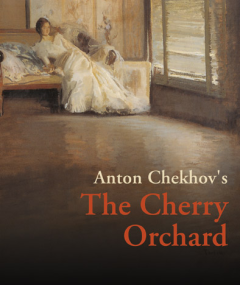The Cherry Orchard
Play written by Anton Chekhov
I’ve certainly started to notice the recurring characters as I close in on number three hundred in this essay cycle. Although I commented on just about everything except the play itself, Checkhov came up when I wrote about Vanya on 42nd Street. That was entry number fifty-one, which feels like years ago because it was.
I was forced to read Chekhov before I ever saw his work staged. The teacher, no doubt, tried to imbue the play with something relate-able for teens in late twentieth century America. Whatever that was, it took a production of The Seagull for me to get it. Honestly, that’s a play that appeals to modern teen angst, but I would have to guess that the earlier teacher was not all that keen on presenting yet another tale of young life cut off by suicide.
But here’s the thing. Chekhov was not writing Romeo and Juliet. Konstantin is a putz. He tries to kill himself multiple times as he somehow deems this an appropriate response to setbacks. He’s essentially a drama king and I have mostly seen his behavior in the first part of the play played for laughs (not guffaws, but he still). His shocking surrender to personal failure and subsequent suicide are powerful, but they don’t so really redeem him. That’s a difficult message to discuss with a classroom of teenagers, barely able to subdue their own inner drama kings and queens.

While I didn’t have the maturity to perceive what a fool Konstantin was all the way through to the end, I did understand that the play before me was really quite good. (No young person with artistic aspirations is ever going to acknowledge the true heights of another’s work. “Really quite good” has to count as high praise indeed. Let’s not forget that there may be something essentially healthy in believing you can climb that mountain.)
Soon enough,
I confronted The Cherry Orchard and it took my breath away. The ending was absolutely perfect and said everything that needed saying and it broke my heart. This was a boring drawing room drama about Russia about 70 years before I was born and it blew me away. The entire world intruded on that drawing room and all that weight was so beautifully dramatized.
Here’s a leap for you- I think Chekhov might be why I still think highly of Star Wars (even before the recent resurgence). I’m not convinced I needed to stop liking the movie series, but I might have been forgiven for not respecting it quite so much. One of the many things I learned from Chekhov about art, let alone life, was to look at the inner story going on before me. Modern blockbusters overwhelm us with thunder and lightning, often to distract us from a lack of plat. We all know this and sort of expect it.
But what about looking for the inner story? Chekhov helps me to focus on that and I still rather like the inner story of Star Wars- the way the main characters interact with one another and their world and the choices that are indicated through the storytelling by the people involved. (Don’t get me started on some of the conceits of the universe, but that’s not why I like the movies.)
In short, Chekhov helps me watch closely. He helps me avoid the magician’s trick of distraction, so co-opted by film makers and other artists.
What’s it all about?
You’ve Got to Check This Out is a blog series about music, words, and all sorts of artistic matters. It started with an explanation. 10 more to go.
New additions to You’ve Got to Check This Out release regularly. Also, free humor, short works, and poetry post irregularly. Receive notifications on Facebook by friending or following Craig.
Images may be subject to copyright.